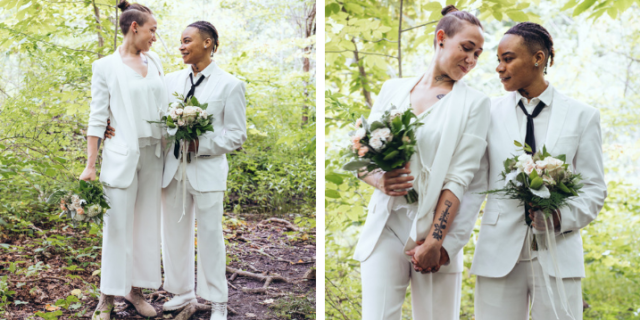
Planning any wedding is notoriously stressful. What about a lesbian wedding? Add in being queer, and having to deal with an industry that was built for straight people, and the anxiety (and work!) intensifies.
In my own wedding planning, I’m constantly coming out to vendors, correcting their paperwork (there’s no “groom” info to fill out, just two brides, hi!) and trying to incorporate wedding traditions in my own life with my partner. As I’ve learned while trying to nudge wedding industry folks to use gender-neutral language, I’m far from a pro wedding planner.
Luckily, though, there are queer wedding planners that just get it, like Cindy Savage.
Cindy Savage, owner and wedding planner at Aisle Less Traveled, started her career in theater, working as a stage manager and organizing fundraisers. But after getting engaged and planning her own gay wedding, Cindy decided to “branch out and start a business.” Six years later, she’s an expert at planning non-traditional (and traditional) weddings for couples of all gender identities.
GO spoke with Cindy about queer wedding planning, how to advocate for yourself if you can’t find a lesbian wedding planner, and why LGBTQ weddings can be (okay, are) the best weddings.
“People will say that gay and lesbian weddings are the same, and we should treat them the same, but that’s not true,” Savage says. “LGBTQ people face discrimination in all parts of our lives, and especially in the wedding industry, and really all over the place. Discrimination is everywhere, it sucks.”
The biggest difference Savage sees in queer weddings versus straight weddings is the lack of family support for queer couples. The other is industry discrimination. Despite nationwide marriage equality being legalized over three years ago, wedding vendors still discriminate. Savage says she’s encountered vendors who will say things like “We don’t do gay weddings” or will just act uncomfortable, signifying that they really just don’t want to take part in a same-sex wedding.
“It’s an added stress of planning a wedding, having to research vendors that are LGBTQ-friendly,” Savage says.
Fortunately, vendor registries on wedding sites like Equally Wed, Catalyst Weddings and Offbeat Bride only include businesses that are LGBTQ-friendly. In rural and conservative areas, Savage recommends looking at a vendor’s website and social media to see if they depict any LGBTQ couples or use gender-neutral language. If you can’t find someone in your area, Savage notes that a lot of wedding vendors are willing to travel—sometimes in exchange for travel costs, if you live in a destination-worthy place. For those unsure if a vendor will service their queer wedding, Savage recommends just straight up asking. Try an email like: “Hey my partner X and I are getting married, we’re a lesbian couple, we’re interested in working with equality-minded vendors. Have you worked with LGBTQ couples before and if not are you interested?” Straight and opposite-sex couples can also find LGBTQ vendors that way as a show of support, Savage says.
Even vendors who support and service same-sex weddings may not use gender-neutral or relevant language on their paperwork, which, inevitably, is a huge part of wedding planning. So many forms to fill out!
“Gendered language is a huge issue in the industry, and there’s movement to fix it,” Savage says. “I use all gender-neutral language on my website and paperwork, so I don’t put bride and groom, but rather partners or the couple and encourage people to use this.”
Asking vendors and other people you’re working with to change their forms to suit your needs is perfectly acceptable, Savage notes. The wording problem also expands into a larger feminist issue: It’s often presumed that “the bride” is planning the wedding, while “the groom” just shows up.
“It takes two people to get married, and a lot of the language is bride-centric—not even acknowledging that grooms exist,” Savage says.
Changing up terminology isn’t the only way queer couples can actually customize their weddings beyond the hyper-traditional bride-and-groom routines.
“Because we don’t have the centuries of tradition behind us, we can say f*ck you to tradition and customize and personalize our weddings,” Savage says. “We don’t have the same pressure to adhere to the structure of a dance and then a cake and the must-haves or should-haves. We get freedom and creativity and less pressure to adhere to tradition.”
That freedom can come in writing your own ceremony and playing with gender roles, like two brides walking down the aisle together or entering at the same time from separate places and meeting in the middle. Or throwing whatever kind of reception you want. It’s your day!
“There are so many ways to change it up, and they’re all applicable to everybody,” Savage says.
As a wedding planner, her best advice to engaged couples and wedding industry folks is to never assume anything. When Savage takes on new clients, she starts with a mini class in which she walks a couple through what they want in a wedding, creating a joint vision for the big day.
“This brings up hopes, expectations, and priorities. It’s very hippy-dippy,” she says. “I use my imagination to suggest new ideas and remove any limits—we’re free from traditions and really don’t have our own traditions.”
And building your own unique traditions on your wedding day can be such a privilege.
No two weddings are alike. But the beauty of a queer wedding is that you can truly embrace what makes you unique as a couple and let your love shine on the day you get married.

What Do You Think?